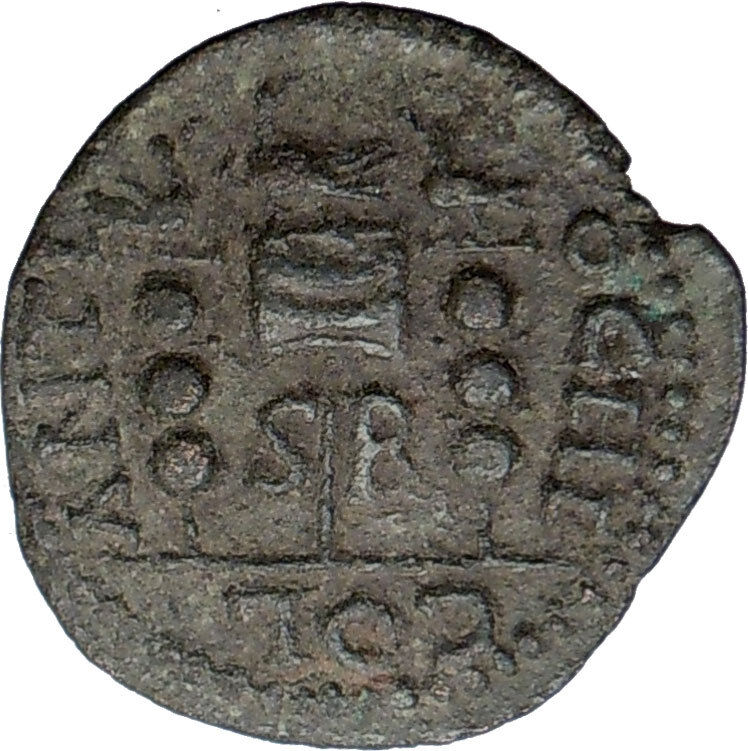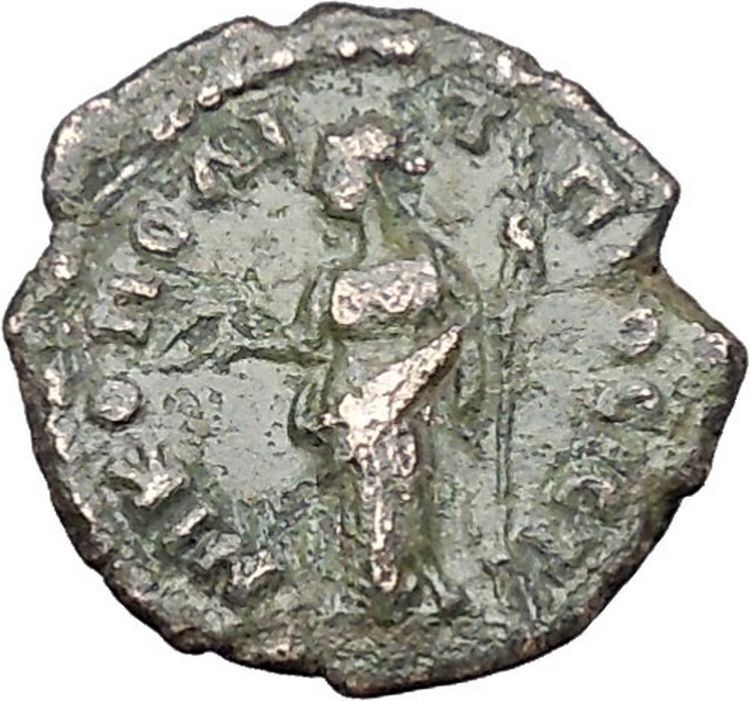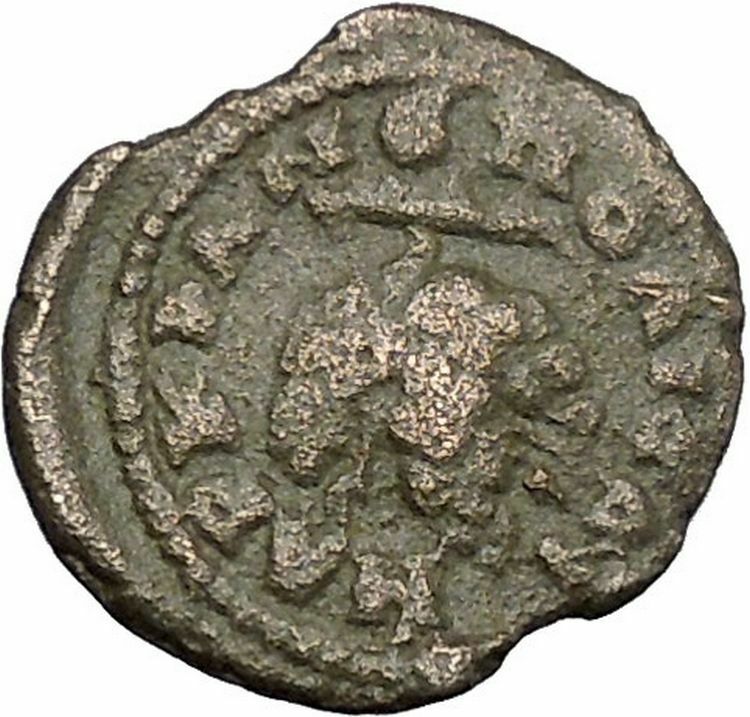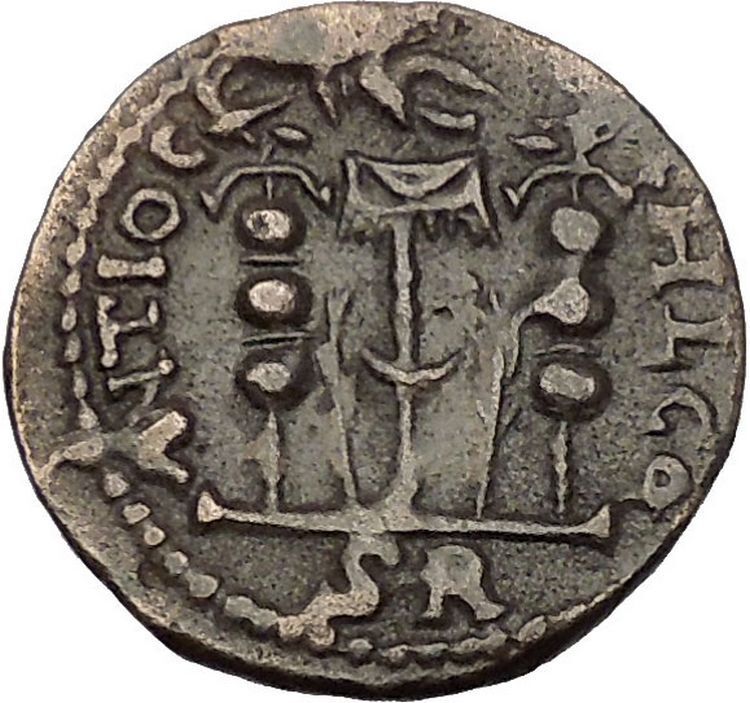|
Livia – Augusta: 14-29 A.D.
Bronze 12mm (2.55 grams) of Eucarpia mint in Phrygia
Struck after 14 A.D.
Reference: RPC I 3160; BMC 14; Rare
ΣEBAΣTH, Draped bust of Livia right.
EYKAPΠITIKOY AΠΦIA IEPHA in four lines within circular border. 2.36g, 13mm, 12h.
Wife of Augustus, Mother of Tiberius, & Grandmother of Claudius.
You are bidding on the exact item pictured, provided with a Certificate of Authenticity and Lifetime Guarantee of Authenticity.
 Livia Drusilla, (Classical Latin: LIVIA•DRVSILLA, LIVIA•AVGVSTA) (58 BC-AD 29), after her formal adoption into the Julian family in AD 14 also known as Julia Augusta, was a Roman empress as the third wife of the Livia Drusilla, (Classical Latin: LIVIA•DRVSILLA, LIVIA•AVGVSTA) (58 BC-AD 29), after her formal adoption into the Julian family in AD 14 also known as Julia Augusta, was a Roman empress as the third wife of the
Emperor Augustus and his advisor. She was the mother of the Emperor Tiberius, paternal grandmother of the Emperor Claudius, paternal great-grandmother of the Emperor Caligula, and maternal great-great grandmother of the Emperor Nero. She was deified by Claudius who acknowledged her title of Augusta.
She was born on 30 January 59 or 58 BC as the daughter of Marcus Livius Drusus Claudianus by his wife Aufidia, a daughter of the magistrate Marcus Aufidius Lurco. The diminutive Drusilla often found in her name suggests that she was a second daughter. Marcus Livius Drusus was her brother. She was probably married in 43 BC. Her first child, the future Emperor Tiberius, was born in 42 BC. Her father married her to Tiberius Claudius Nero, her cousin of patrician status who was fighting with him on the side of Julius Caesar’s assassins against Octavian. Her father committed suicide in the Battle of Philippi, along with Gaius Cassius Longinus and Marcus Junius Brutus, but her husband continued fighting against Octavian, now on behalf of Mark Antony and his brother. In 40 BC, the family was forced to flee Italy in order to avoid Octavian’s proscriptions and joined with Sextus Pompeius in Sicily, later moving on to Greece.
A general amnesty was announced, and Livia returned to Rome, where she was personally introduced to Octavian in 39 BC. At this time, Livia already had a son, the future emperor Tiberius, and was pregnant with the second, Nero Claudius Drusus (also known as Drusus the Elder). Legend said that Octavian fell immediately in love with her, despite the fact that he was still married to Scribonia. Octavian divorced Scribonia in 39 BC, on the very day that she gave birth to his daughter Julia the Elder (Cassius Dio). Seemingly around that time, when Livia was six months pregnant, Tiberius Claudius Nero was persuaded or forced by Octavian to divorce Livia. On 14 January, the child was born. Octavian and Livia married on January 17, waiving the traditional waiting period. Tiberius Claudius Nero was present at the wedding, giving her in marriage “just as a father would.” The importance of the patrician Claudii to Octavian’s cause, and the political survival of the Claudii Nerones are probably more rational explanations for the tempestuous union. Nevertheless, Livia and Octavian remained married for the next 51 years, despite the fact that they had no children apart from a single miscarriage. She always enjoyed the status of privileged counselor to her husband, petitioning him on the behalf of others and influencing his policies, an unusual role for a Roman wife in a culture dominated by the paterfamilias.
After Mark Antony’s suicide following the Battle of Actium in 31 BC, Octavian had removed all obstacles to his power and henceforth ruled as Emperor, from 27 BC on, under the honorary title Augustus. He and Livia formed the role model for Roman households. Despite their wealth and power, Augustus’s family continued to live modestly in their house on the Palatine Hill. Livia would set the pattern for the noble Roman matrona. She wore neither excessive jewelry nor pretentious costumes, she took care of the household and her husband (often making his clothes herself), always faithful and dedicated. In 35 BC Octavian gave Livia the unprecedented honour of ruling her own finances and dedicated a public statue to her. She had her own circle of clients and pushed many protégés into political offices, including the grandfathers of the later emperors Galba and Otho.
With Augustus being the father of only one daughter (Julia the Elder by Scribonia), Livia revealed herself to be an ambitious mother and soon started to push her own sons Tiberius and Nero Claudius Drusus into power. Drusus was a trusted general and married Augustus’s favourite niece, Antonia Minor, and had three children: the popular general Germanicus, Livilla, and the Emperor Claudius. Tiberius married Augustus’ daughter Julia the Elder in 11 BC and was ultimately adopted by his stepfather in 4 BC and named as Augustus’ heir.
Rumor had it that when Marcellus, nephew of Augustus, died in 23 BC, it was no natural death, and that Livia was behind it.[9] After the two elder sons of Julia by Marcus Vipsanius Agrippa, whom Augustus had adopted as sons and successors, had died, the one remaining son Agrippa Postumus was incarcerated and finally killed. Tacitus charges that Livia was not altogether innocent of these deaths and Cassius Dio also mentions such rumours, but not even the gossipmonger Suetonius, who had access to official documents, repeats them. Most modern historical accounts of Livia’s life discount the idea. There are also rumors mentioned by Tacitus and Cassius Dio that Livia brought about Augustus’ death by poisoning fresh figs. Augustus’ granddaughter was Julia the Younger. Sometime between 1 and 14, her husband Paullus was executed as a conspirator in a revolt. Modern historians theorize that Julia’s exile was not actually for adultery but for involvement in Paulus’ revolt. Livia Drusilla plotted against her stepdaughter’s family and ruined them. This led to open compassion for the fallen family. Julia died in 29 AD on the same island where she had been sent in exile twenty years earlier.
Life after Augustus, Death, and Aftermath
Augustus died in AD 14, being deified by the senate shortly afterwards. In his will, he left one third of his property to Livia, and the other two thirds to Tiberius. In the will, he also adopted her into the Julian family and granted her the honorific title of Augusta. These dispositions permitted Livia to maintain her status and power after his death, under the new name of Julia Augusta.
For some time, Livia and her son Tiberius, the new Emperor, appeared to get along with each other. Speaking against her became treason in AD 20, and in AD 24 he granted his mother a theatre seat among the Vestal Virgins. Livia exercised unofficial but very real power in Rome. Eventually, Tiberius became resentful of his mother’s political status, particularly against the idea that it was she who had given him the throne. At the beginning of the reign he vetoed the unprecedented title Mater Patriae (“Mother of the Fatherland”) that the Senate wanted to bestow upon her, in the same manner in which Augustus had been named Pater Patriae (“Father of the Fatherland”). (Tiberius also consistently refused the title of Pater Patriae for himself.)
The historians Tacitus and Cassius Dio depict an overweening, even domineering dowager, ready to interfere in Tiberius’ decisions, the most notable instances being the case of Urgulania (grandmother of Claudius’s first wife Plautia Urgulanilla), a woman who correctly assumed that her friendship with the empress placed her above the law, and Munatia Plancina, suspected of murdering Germanicus and saved at Livia’s entreaty. (Plancina committed suicide in 33 AD after being accused again of murder after Livia’s death). A notice from AD 22 records that Julia Augusta (Livia) dedicated a statue to Augustus in the centre of Rome, placing her own name even before that of Tiberius.
Ancient historians give as a reason for Tiberius’ retirement to Capri his inability to endure her any longer. Until AD 22 there had, according to Tacitus, been “a genuine harmony between mother and son, or a hatred well concealed;” Dio tells us that at the time of his accession already Tiberius heartily loathed her. In AD 22 she had fallen ill, and Tiberius had hastened back to Rome in order to be with her. But in AD 29 when she finally fell ill and died, he remained on Capri, pleading pressure of work and sending Caligula to deliver the funeral oration. Suetonius adds the macabre detail that “when she died… after a delay of several days, during which he held out hope of his coming, [she was at last] buried because the condition of the corpse made it necessary…”. Divine honours he also vetoed, stating that this was in accord with her own instructions. Later he vetoed all the honours the Senate had granted her after her death and canceled the fulfillment of her will.
It was not until 13 years later, in AD 42 during the reign of her grandson Claudius, that all her honours were restored and her deification finally completed. She was named Diva Augusta (The Divine Augusta), and an elephant-drawn chariot conveyed her image to all public games. A statue of her was set up in the temple of Augustus along with her husband’s, races were held in her honour, and women were to invoke her name in their sacred oaths. In 410 AD during the Sack of Rome (410) her ashes were scattered when Augustus’ tomb was sacked.
Her Villa ad Gallinas Albas north of Rome is currently being excavated; its famous frescoes of imaginary garden views may be seen at National Museum of Rome. One of the most famous statues of Augustus (the Augustus of Prima Porta) came from the grounds of the villa.
|





 Livia Drusilla, (Classical Latin: LIVIA•DRVSILLA, LIVIA•AVGVSTA) (58 BC-AD 29), after her formal adoption into the Julian family in AD 14 also known as Julia Augusta, was a Roman empress as the third wife of the
Livia Drusilla, (Classical Latin: LIVIA•DRVSILLA, LIVIA•AVGVSTA) (58 BC-AD 29), after her formal adoption into the Julian family in AD 14 also known as Julia Augusta, was a Roman empress as the third wife of the 




